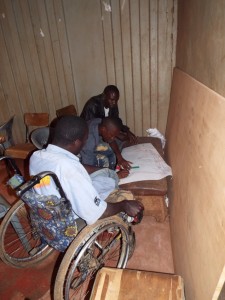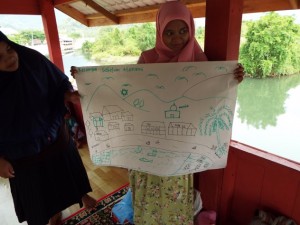By Becky Murphy Lead LPRR Researcher at KCL & Resilience Learning and Capacity Building Officer at Christian Aid
“Sometimes a disaster can be an opportunity. A shock forces you to stop, step back, reflect and see all that was wrong and all that needs to change” (Local Partner Field Staff)
“If you don’t learn how can you teach?” (Local Partner Field Staff)
LPRR…
A collection of humanitarian organisations have embarked on a three year critical self-reflection process. Here, humanitarian programming is being analysed, and in doing so, crises affected community members and in country field staff are being given a platform to voice their recommendations, thoughts and hopes for improved humanitarian aid.
The access to this level of expertise, hopes to guide the aid sector to be able to build long-term community resilience and harness the social and political space that disasters create. With this, it aims to map out a strategy to challenge the existing norms that (re)produce community vulnerability and strengthen community resilience.
This three year critical review is a START DEPP project called Linking Preparedness Resilience and Response (LPRR). The over-all aim of the project is to utilise resilience to bridge the gap between short-term emergency response and longer-term development.
More information on the project can be found here: http://www.start-network.org/how/start-engage/linking-preparedness-response-resilience/#.V6iJ2meFPIU
LPRR stops & reflects at its’ half way mark…
Seeing as eight INGO’s (Lead – Christian Aid and Kings College London, other; Action Aid, Concern Worldwide, Help Age, Muslim Aid, Oxfam, Saferworld and World Vison) have embarked on a period of critical self-reflection, we thought it only fair that the LPRR project itself stops and reflects at regular intervals.

The LPRR project has reached its big half way mark of case study data collection. Over the past eight months the project has travelled to and collected data from multiple past humanitarian interventions in the Philippines, Kenya, Indonesia and Pakistan. Hitting the half way mark means that it is time to stop and reflect on the research methods and see if there are any initial findings or core themes running throughout.
So what have we observed so far?
Observations & Reflections:
- What is ‘Resilience’; a buzz word or an opportunity for post crises transformation?
It is no secret that the term ‘resilience’ is a tricky one, particularly to translate and explain in a local dialect. With the fact that the LPRR project is underpinned by Bene et al’s (2012) Absorb, Adapt, and Transform academic, conceptual framework it was quite a challenge to think, how best to explain this, across multiple countries, languages and contexts. http://www.ids.ac.uk/publication/resilience-new-utopia-or-new-tyranny
The LPRR project wanted to ask communities what resilience means to them and what they would recommend should be done to get there. So, each case study started with an interesting process of translating and back translating resilience into each local language.
Ultimately, for all crises affected communities resilience means tackling the root causes of inequality, fragility and vulnerability (whether this is food insecurity, lack of land rights, lack of livelihood opportunities or protracted conflict etc.) and the power inequalities that (re)produce and (re)create this.
Resilience means independence and the empowerment, knowledge and resources to look after oneself, whilst knowing where to go, who to ask and how to call for additional support if needed. In Bene et al’s (2012) language this could mean societal transformation; enabling the stability and power for communities to cope, adapt and further transform with changing risks.
- So, what do the local experts (field staff and survivors) recommend?
The first five case studies, despite being based in vastly different contexts, have highlighted a number of reoccurring themes and recommendations.
Ideally, the LPRR project hopes to develop a list of ‘no regrets’ actions that can be implemented immediately in a humanitarian response; a set of actions which have the potential to lay the foundations down for longer term resilience building. The foundations would pave the way for greater resilience building efforts in the recovery and rehabilitation phases of humanitarian response. Then, a second set of actions will be mapped out which will require a little more strategic planning and understanding of the context.
Reoccurring Themes:
So far eight core recommendations / areas for further thinking have been outlined by the disaster survivors and local field staff.
These include:
- The importance of strengthening and not undermining social cohesion and community togetherness during an intervention
- The importance of tackling root causes of vulnerability
- The importance of involving the community from the offset; the importance of community participation; working alongside the community
- The need for psycho social support to be implemented as a necessity not a luxury
- The need to effectively coordinate all humanitarian interventions through one lead organisation or coordinating body
- The need for capacity building around sustainable livelihoods and the promotion of savings
- The importance of involving and working through the government from the offset, handing over to the government in the exit strategy and building both government responsibility and the capacity of the community to advocate for rights and needs.
- The need for effective communication between aid workers and community members with project timelines and beneficiary selection clearly shared
Taking it back to London: critical reflections from HQ
Creating time to reflect at this halfway point means discussion groups with the LPRR consortia, HQ based field staff, technical experts, humanitarian leaders and in country teams who were not involved in the data collection.
On the 11th August 2016 a discussion group of experienced Christian Aid humanitarian response officers came together to reflect on the local recommendations, explore the practicalities and what it means for the sector. Each recommendation was reflected upon.
The need to support and not undermine social cohesion, the need for participation from the offset and the need for clear communication
- Agreed; this is good practice and accountability.
- This can be done by working alongside the community not for them. Good, equitable participation will require good communication and support social cohesion.
- Keep in mind your modes of participation here and think about who you are including / excluding and why and how you are mobilising the community.
The need for Psycho-Social Support
- Agreed but there is a lack of capacity and skill sets in (I) NGO’s and partners to do this properly.
- The sector is beginning to recognise this. It is an issue of capacity.
- The sector needs to train, employ and fund these experts. Church of Sweden is a leader in this field.
- There is a need to distinguish what psycho-social support is and the difference between the benefits of community self-help groups and more formal trauma centres.
Capacity Building around Livelihoods and Savings
- Agreed but can be pushed to the early recovery phase not immediate response.
- We also need to include capacity building on preparedness and emergency response.
- We also need to build local staff capacity as well as community members. This can be done pre-crises.
Better Coordination
- Proper coordination with other (I)NGO’s is not a new debate and whilst we may be doing better than we were, we still need to improve this.
- The team said this was OCHA’s responsibility; however we need to lead by example and make bigger efforts to do this properly.
A practical toolkit?
If we take the ‘no regrets actions’ and flow chart of questions idea for a final toolkit; this initial discussion helps categorise which recommendations could fit where.
First set of recommendations: no regrets
Providing you have the capacity to do it properly and they are implemented through the do no harm and core humanitarian standards, this could include:
- Psycho – social support
- Working alongside the community; participation, communication and social togetherness
- Capacity building: livelihoods, savings and emergency response and preparedness (both community and local partners)
- Collaborate properly with other (I)NGOs
Second set of recommendations:
Would require an in-depth context analysis/understanding and a set of reflective questions to guide, understating it is not always appropriate depending on context
- Work alongside and with the government
- Tackle/ advocate for root causes to be tackled
Now what?
Next, the research team will travel to Colombia, DRC, Bangladesh and/or Myanmar. Here, LPRR hopes to see how recommendations may change or adjust in conflict contexts.
In November 2016 we will be sharing the community members’ and field staff’s first thoughts with a group of humanitarian leaders; the heads of humanitarian departments throughout the consortium, to get their insights, reflections and support for rolling out recommendations.
So…
What do you think? You can reflect on what you have read here by leaving a comment in the comment box or getting in contact with Becky Murphy at rmurphy@christian-aid.org
*Al l images ©Rebecca Murphy & LPRR



